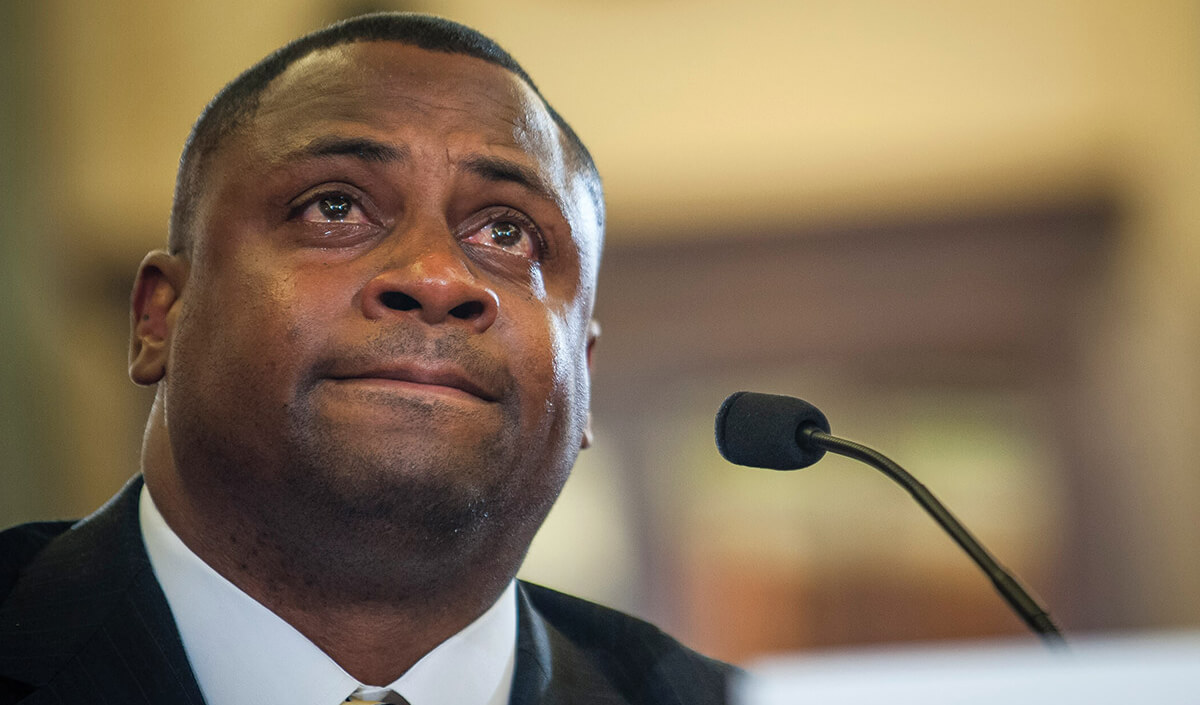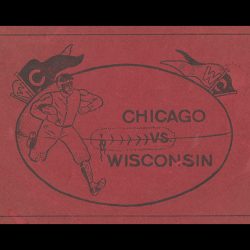
The Good Guy
These days Troy Vincent’s determined to reach a different goal line for the NFL and its players.
He lived the horror of domestic violence, seeing the cast on his mother’s broken arm. He hid under his bed or huddled in the closet as her boyfriend beat her, trying to escape the screams coming from the other side of the bedroom wall. There were times he and his younger brother called 911, with their mother lying unconscious nearby.
Choking back the painful memories, Troy Vincent x’92 told his story. A player in the National Football League (NFL) for fifteen years, he now serves as the league’s executive vice president of football operations. Last year, Vincent appeared in Washington before a combative U.S. Senate committee during a hearing on domestic violence in professional sports. The video of Baltimore Ravens running back Ray Rice punching his fiancée and dragging her from an elevator was fresh in the minds of senators who wanted to know what the NFL was doing to prevent similar crimes.
“We have to break the culture of silence,” Vincent told them.
His voice trembled and tears pooled in his eyes as the six-foot-one former defensive back and five-time Pro Bowler recounted the darkest days of his childhood. “We saw how she struggled to seek help and find the voice and courage to say, ‘No more.’ The sense of fear, powerlessness, and all the complexities that accompany this violence remain very real for me today,” Vincent told the committee.
The father of five has advocated against domestic violence for more than twenty years in his role as an NFL player, union leader, and now league executive. And UW–Madison was where he found both his voice and a path to becoming a student, an athlete, and a survivor determined to find ways to help others.
• • •
The Badgers were not a good football team when they recruited Vincent from the Pennsylvania high school he attended to escape the drugs, gangs, and violence that plagued his Trenton, New Jersey, neighborhood. Yet he and his mother, Alma, decided to visit Madison on an ideal fall weekend. It was sunny. He tasted a brat for the first time. The people were genuine, and — most important — it just felt right.
“Unlike what we see today, where many institutions are trying to sell something they’re not, Wisconsin was trying to sell me the school’s core values and the promise of a first-class education,” he says. “Wisconsin was genuine, sincere, stressing tradition and education, and that resonated with the family.” He picked Wisconsin.
During the season, Vincent’s relatives piled into an RV and traveled from the East Coast to attend as many games as they could. In his office, Vincent keeps a photo of himself from Senior Day at Camp Randall, posing with his mother and grandfather, who was wearing giant gloves and earmuffs.
“They hated that cold, but they did what they had to do,” he says.
On campus, Vincent struggled with shyness, recalls Jane Piliavin, a professor emerita of sociology who met him during his freshman year, when they were paired in a mentoring program aimed at curbing the high dropout rate among students of color. One day he came to her office after arriving late for a class; he couldn’t get up the nerve to enter the lecture hall, even though he needed to speak with the professor.
How to be a Pro
A veteran NFL player could easily stand back and watch a rookie make mistakes. That wasn’t the case, though, with John Offerdahl, a Wisconsin Rapids native who was a veteran linebacker with the Miami Dolphins when the team drafted Troy Vincent in 1992. “He was one who came and tapped me on my shoulder,” Vincent recalls. “He said, ‘Hey, young fella, Coach [Don] Shula said that you have an opportunity to be a special player. Become a pro first.” Vincent says Offerdahl taught him key lessons for success in football and in life: “Always be on time for meetings. Always sit up front. And never come into a meeting room without your notebook. Respect every coach, because you never know where a coach is going to end up. And respect this game. And you’ll be okay.”
“We sat on the floor next to the [classroom] door, because I wanted to make sure that he actually did talk to that professor,” she says.
NCAA rules prohibited Piliavin from taking Vincent out to a restaurant for dinner, so he soon was spending most Sundays at her home for brunch. Her late husband, Irv, a professor of social work, didn’t cook, but he learned how to make omelets. Sausage, bacon, and morning buns were plentiful, and Vincent usually brought three or four hungry friends along with him. He says those Sunday conversations with the faculty couple, combined with his classes on campus, “stretched my mind in places that I never thought it could go,” and they guided his life in the years that followed.
“They shaped how I became a father. It shaped my relationship with my parents, my mom. It shaped what kind of teammate or leader I would become,” he says. “That’s what Madison did for me.”
As a UW student, Vincent volunteered at food pantries and women’s shelters. He saw himself in the young kids he met in those places: children of single mothers working two or more jobs who often had to take care of their younger siblings.
Halfway through Vincent’s college football experience, Barry Alvarez arrived to take over the losing program. At that point, Vincent had begun to conflate his abilities on the field with that of the team’s 3–19 record during the previous two years. “Troy was really a gifted athlete but didn’t know it,” Alvarez says.
That changed for Vincent in a conversation with Alvarez, when he compared him to Todd Lyght, a defensive back he had coached the previous season at Notre Dame. Lyght was the fifth overall pick in the 1991 NFL draft — very impressive, but Alvarez told Vincent that he was bigger, faster, and more physical than Lyght. “He’s the fifth guy taken. Not the fifth round. Fifth guy. That’s how I see you,” Alvarez told him.
Vincent’s subsequent performance on the field earned him accolades, including first-team All-American, runner-up for the Jim Thorpe Award as the nation’s top defensive back, and Big Ten co-Defensive Player of the Year in 1991. He also set the school record for career punt-return yards.
During the fall semester of Vincent’s senior year, agents called day and night, Piliavin recalls. “We went home one day and found him in our bed asleep, because he had not been able to sleep the night before because people kept calling him. But that, of course, made him realize, ‘I can be something. I can be somebody,’ ” says Piliavin, who attended the 1992 draft with her husband and daughter, seeing Vincent selected seventh overall, heading to the Miami Dolphins.
A photo of him in his Dolphins uniform hangs in her Madison office, where she still teaches a summer course on the sociology of sport. “He would not have told you this,” she says as she pulls a magazine from her file drawer. It’s the July 2003 edition of Sporting News, with Vincent gracing the magazine’s cover as its No. 1 Good Guy. Piliavin discusses Vincent with her students at the conclusion of a section on bad behavior by professional athletes, reminding them that they won’t hear about the good things some of them do.
Vincent’s connections to Wisconsin still run deep. His daughter, Desire, attended the UW and served as a Badger football recruiting assistant. He visits campus every year, contributed to the Camp Randall Stadium renovation, and endowed a football scholarship for Badger defensive backs.
• • •
When Vincent was growing up, his grandfather had the family make peanut-butter-and-jelly sandwiches to pass out to hungry people in their neighborhood. When he played for the Philadelphia Eagles, Vincent did the same with his wife, Tommi, and their children. The family also filled trucks with coats, hats, and gloves to give to those needing winter clothing. The couple formalized their charitable efforts in Trenton in the 1990s by founding Love Thy Neighbor, a nonprofit organization that has provided college scholarships, mentoring programs for fathers and college-bound students, and school supplies for children in inner-city elementary schools, among many other initiatives over the years. The Vincents also helped to restore a park in his old neighborhood where he once played basketball, but insisted it be named for his grandfather, Jefferson Vincent. “He had gardens. He organized the community, made sure people got out and voted,” Vincent says. “[He] was a difference-maker.”
Vincent was short the credits needed to graduate when he left Madison for Miami, but he took classes at Temple University in Philadelphia while still playing in the NFL. He completed his undergraduate degree at Thomas Edison State College in Trenton, before moving on to earn certificates from executive education programs at several universities, including Harvard and Northwestern, and the Wharton School at the University of Pennsylvania. He served as president of the NFL Players Association for four years and then joined the NFL front office in 2010 to lead the league’s player engagement department, which provides support programs for players and their families.
These days, his top priority is preserving the integrity and the competitive fairness of the game, he says. It was his signature on the letter sent to New England Patriots quarterback Tom Brady detailing his suspension due to “Deflategate,” allegations that Brady was involved in tampering with the ball during last year’s AFC championship game.
He is now working his way through an online sports-management graduate-degree program. “I told my son I’ll have my MBA before he finishes college,” he says.
Troy Jr. plays cornerback for North Carolina State University. Vincent’s son Taron is a high school sophomore who is already being recruited by a number of colleges, including Wisconsin. Vincent has seven concussions on the books, but he doesn’t hesitate to say he feels good about the safety of the game today, especially when compared to his rookie season in 1992.
“We know more today,” he says. “There are natural risks associated with the sport itself, but we’re trying with all of our power, resources, and the right partners to [protect] players from unnecessary risk.”
Vincent received a Jefferson Award, known as the Nobel Prize for public service, in 2012. He is also the only NFL player to receive four major honors for character, leadership, and community service:
Athletes in Action/Bart Starr award, 2005
Walter Payton NFL Man of the Year, 2002
NFLPA Byron Whizzer White Award, 2003
Sporting News No. 1 Good Guy, 2003
• • •
When Vincent discussed growing up in the shadow of domestic violence so publicly on Capitol Hill, he did so with his mother’s blessing. “People don’t understand what a victim goes through or what that’s like,” he says. “It’s important to me to be the voice for the voiceless.”
The NFL established a mandatory education program for five thousand league employees and is training critical-response teams to quickly react to family violence and sexual assault. Earlier this year, Vincent traveled to the Austin, Texas, headquarters of the National Domestic Violence Hotline to visit with staff and learn more about the services it provides to victims. The league is giving the organization $5 million a year during the next five years — money that has allowed the hotline to add staff, seek larger office space, and open shop in Washington, DC, to lobby lawmakers on key issues.
Most important, the staff can answer more calls. Too many were going unanswered for those seeking help, Vincent says.
“If you think of the calls as answered, someone is being advised properly. Someone’s hearing a voice on the other end of the phone. That may be the voice that saves their life,” he says. “This is so important, because the difference we’re making is not in football, we’re making a difference now in society.”
Jenny Price ’96 is senior writer for On Wisconsin.
Published in the Winter 2015 issue



Comments
No comments posted yet.